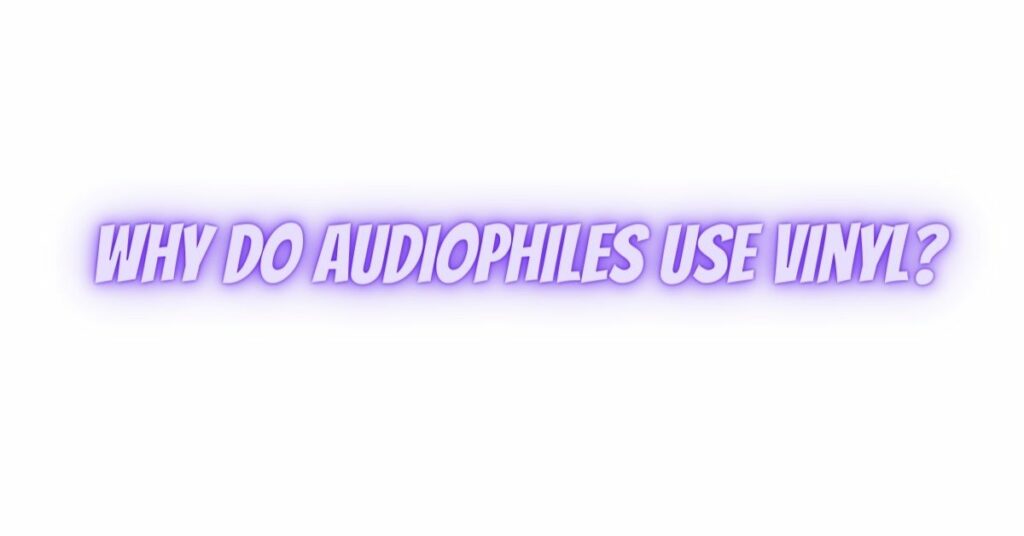Audiophiles, a dedicated group of music enthusiasts with an unwavering pursuit of high-fidelity audio, have long been associated with their preference for vinyl records. While digital formats and streaming services dominate the contemporary music landscape, audiophiles continue to champion vinyl as the ultimate medium for achieving sonic excellence. In this comprehensive article, we explore the reasons why audiophiles favor vinyl, dissecting the unique qualities that make it their format of choice.
- Analog Warmth and Authenticity
One of the primary drivers behind the audiophile’s preference for vinyl is the analog nature of the format. Vinyl records capture sound as continuous waveforms, resulting in a warm and authentic listening experience that is often described as more lifelike and less sterile compared to digital formats.
- Natural Sound: Vinyl’s analog nature replicates the way we perceive sound in the real world, delivering a more natural and authentic listening experience.
- Smooth Transitions: Vinyl offers smooth and continuous transitions between sound frequencies, avoiding the abruptness often associated with digital sampling.
- Harmonic Distortion: Vinyl introduces pleasing harmonic distortion, which can add depth and character to the music, making it more enjoyable to listen to.
- High Fidelity and Nuances
Vinyl records are celebrated for their ability to preserve the full dynamic range and subtleties of the original recording. This means that vinyl can faithfully reproduce the softest whispers and the loudest crescendos without compression, revealing delicate nuances in the music.
- Broad Dynamic Range: Vinyl records offer a broad dynamic range, allowing for greater contrast between soft and loud passages, thereby enhancing the impact of the music.
- Subtle Details: Vinyl captures fine details and subtleties in the music, making it possible to discern subtle inflections, instrument textures, and acoustic characteristics.
- Tactile Engagement
Playing a vinyl record is a multisensory experience. The physical interaction with the medium adds an extra layer of engagement that digital formats cannot replicate. The act of selecting an album, placing it on the turntable, and gently lowering the stylus creates a sense of ritual and connection to the music.
- Vinyl Ritual: The tactile aspect of vinyl enhances the overall listening experience, fostering a deep connection with the music.
- Album Art: Vinyl records showcase elaborate album artwork and liner notes that add an extra visual component to the music, contributing to the immersive experience.
- Collector’s Paradise
Vinyl records hold an innate allure for collectors, and the hunt for rare and limited-edition pressings adds an exciting dimension to the vinyl experience. Collectors often value vinyl records for their uniqueness, scarcity, and the history they carry.
- Limited Editions: Many vinyl records are produced in limited quantities or as special collector’s editions, making them prized possessions.
- Rarity: Vintage and rare vinyl records can appreciate in value over time, making them sought after by collectors.
- Audiophile-Grade Production
Audiophile labels and pressing plants are renowned for their commitment to producing vinyl records with the utmost attention to sound quality. These labels and facilities employ skilled engineers and operators, employ high-quality presses, and adhere to stringent quality control measures to ensure the highest audio fidelity.
- Sound Quality Purity
The vinyl format maintains an all-analog signal path, preserving the purest representation of the original recording. This minimizes signal degradation and ensures a faithful sound reproduction.
- Signal Purity: The vinyl signal path remains free from digital conversion or compression, preserving the authenticity of the music.
- Minimized Signal Loss: Analog signal paths minimize the loss of audio data, allowing for more accurate representation of the original recording.
- Unique Sound Artifacts
While not without imperfections, vinyl records introduce unique sound artifacts, such as pops, clicks, and surface noise. These imperfections are often seen as adding character and authenticity to the music, making it more relatable and engaging.
Conclusion
Audiophiles choose vinyl for its analog warmth, high fidelity, tactile engagement, collector’s appeal, audiophile-grade production, sound quality purity, and unique sound artifacts. In a world where digital formats have become dominant, vinyl remains the medium of choice for those who seek the ultimate audio experience. For audiophiles, the vinyl format transcends mere playback; it offers an immersive and authentic musical journey that connects them to the art and emotion of the music in a profound way.


